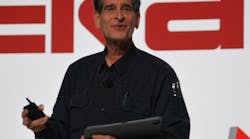Anyone can innovate, but, like most tasks, it’s easier said than done. Two of the world’s best-known innovators and a couple of young FIRST Robotics teams took the stage at Automation Fair 2023 this week in Boston to demonstrate what’s possible.
For instance, Dr. Anousheh Ansari, CEO of the non-profit XPrize Foundation, described growing up in Iran, which included looking at the night sky and wanting to be an astronaut. However, after years of working as a telecommunications entrepreneur, she made her dream real by journeying to the International Space Station (ISS) as part of a three-person launch from the legendary Star City in Russia. She also cofounded the initial $10 million Ansari XPrize, in which 26 privately funded teams collectively invested $100 million and created the multibillion-dollar commercial space industry.
“Back then, it cost $50,000 to get 1 kilogram into space. Now, it’s a couple of thousand dollars, and Starlink and others are working to get the price down to a couple of hundred dollars,” said Ansari. “This will allow us to put some data centers and other manufacturing in orbit, run them with solar power, build space stations and create a lot of other new industries.”
Back on Earth, the foundation is deploying its XPrize model to spur competition and encourage solutions for many other of the world’s most vexing problems. Its mission is inspiring and empowering humanity to accelerate breakthroughs toward creating a world of equitable abundance. The seven grand challenge domains in which it’s presently offering prizes are:
• Climate and energy
• Biodiversity and conservation
• Health
• Learning and society
• Space and exploration
• Deep technology, artificial intelligence (AI) and quantum computing
• Food, water and waste.
“People who know things can help us do better, whether it’s cleaning of oil spills, feeding more people or whatever our challenges are,” said Ansari, who reports the XPrize Foundation leverages every dollar it offers in prizes 31 times. So far, its $300 million in prizes have brought in $9.3 billion in investment, research and change.
“The view from the ISS showed the world as it is, with none of the imaginary lines and boundaries on all our maps. There’s nothing separating us,” said Ansari. “We need to know we’re all interconnected and that we need to collaborate to solve our problems. The lines are blurring between our intelligence and artificial intelligence (AI), which is scary because we’re fearful of losing control. However, while we need to be aware of it, I can’t make decisions or act out of fear. We need to understand, collaborate and work toward the good.”
From robots to regeneration
Pursuing equally innovative and industry-building paths, Dean Kamen, president of Deka Research and Development and founder of For Inspiration and Recognition of Science and Technology (FIRST) Robotics, charted his and his partners’ progress on several fronts:
• Pioneering the first wearable insulin pump
• Developing at-home, peritoneal dialysis devices
• Further improving self-balancing iBot and Segway mobility devices
• Building Freestyle fountains for Coca-Cola that dispense more than 5 billion sets of more than 200 beverage brands
• Researching an intradermal patch for more efficient vaccine delivery.
“The breakthroughs continue because we keep improving on our initial products. For example, iBot is adding LiDAR and radar, so it can identify its environments and serve in security applications,” said Kamen. ” “We have more stuff in our kit than the kids in FIRST Robotics, but the principle of innovation is the same.”
In response to U.S. presidential requests to develop new industries and with some federal funding, Kamen and his partners also launched the Advanced Regenerative Manufacturing Institute (ARMI) in Manchester, New Hampshire, to produce replacement cells and organs for soldiers, veterans and other patients, which many academic institutions apparently can use genomic know-how to create, but don’t make at-scale because they aren’t manufacturers and are hobbled by antiquated labs and facilities.
“We just thought we could accelerate these processes for diabetic, dialysis and organ-replacement patients,” explained Kamen. “I’d rather be on the innovation bus than under it. We can take chronic conditions, and, instead of treating them chronically, we can simply transplant organs with high-quality replacements grown using patient’s own genetics, so there will also be no rejection issues. These aren’t problems that can be solved with petri dishes and pipettes. We’re bringing together the tenets of engineering science to regenerative medicine to create a new bio-fabrication industry.”
Kamen added that Deka is making equipment for ARMI’s member institutes, including United Therapeutics, which is located on the same campus and is now the largest facility focused on 3D printing tissue and organs.
“We spend 21% of our healthcare dollars on chronic conditions, and those costs are only increasing,” added Kamen. “Wouldn’t it be better if we could reduce that trend, replace organs at-scale and give all those patients a better quality of life at less cost?”
As for the innovators who’ll be needed tomorrow, Kamen reported that FIRST Robotics was up to 81,000 teams worldwide in 2021 and had representatives from 191 countries at this year’s event in October in Singapore. In addition, all of them signed the twin declarations of interdependence and responsibility that Kamen drafted after the start of the war in Israel and the Gaza Strip.
“We’ve often said that FIRST isn’t about robots. It’s about using robots to build kids,” explained Kamen. “A seven-year-old girl in one of our videos showed us why when she said, ‘FIRST is CrossFit for the muscle upstairs,’ and added, ‘FIRST is a machine for building people who will change the world.’ We’re more interdependent than ever in the 21st century, and we need to respect truth and science,” concluded Kamen. “The technical community needs to have a loud voice on the importance of being rational. We can’t leave this task to the rest of the world.”



